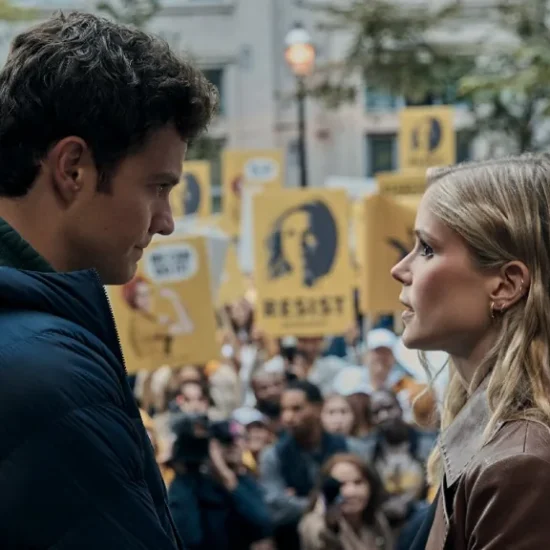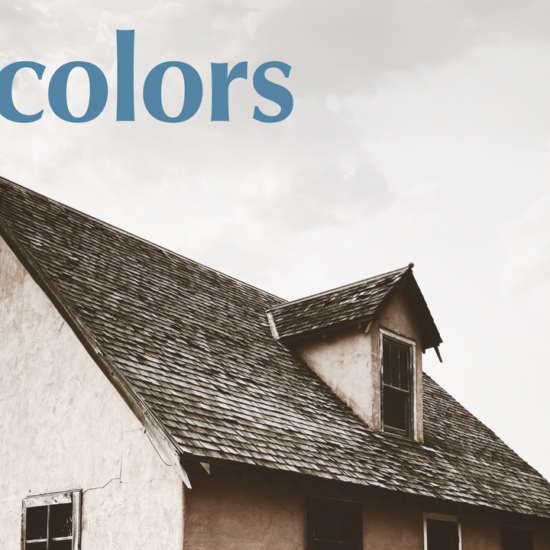
Currently playing at the 2022 Tribeca Film Festival is a must-see movie called Peace in the Valley. The movie focuses on a family dealing with tragedy in the aftermath of a shooting. The re-emergence of an extended family member only complicates the already fragile family, which is on the brink of breaking.

Courtesy of 42West
The film begins with; Brit Shaw (Ashley Rhodes), Michael Abbott Jr. (John Rhodes), and their son and William Samiri (Jesse). Ashley is carefree as she and John walk through a parking lot with their son just like any other typical day to buy some groceries. However, the day turns when a shooter enters the supermarket. In seconds, the family that was once happy is altered forever.
Ashley has a rocky relationship with her mother, Margaret, played by the talented Dendrie Taylor, as the two work to help each other through what happened. While the entire cast is on point in this film, Shaw and Taylor shine in their roles. We had a chance to sit down with both Shaw and Taylor to discuss the film, its importance, its honest portrayals, and why you should see this movie.

Courtesy of 42West
Q: Peace in the valley, even in the past decade, would have been a timely film. However, now it is timelier than ever. So how did you tackle the material? Were you nervous at all?
Shaw: For the opening. It was very interesting because originally, when it was on paper, it was like a big, huge thing. [There was a] big box store, very crowded [with] things going crazy. Once we started really getting into the research, we needed to be quieter. We needed to be simpler – like you just needed to go to the store. [During research] we’re hearing people were in a nail salon and someone just comes in or even what happened in Vegas. It’s like someone just picks an activity that they’re going to do just being a human in this world, and that’s why we made it simple and chose a grocery store. At the time, there had been no grocery store shootings; we thought about that but thought it could happen. And so, it was interesting that just a few weeks ago, it did and has happened a few months as well. But we really did a lot of research in just even like the gunshots that you hear and how you hear him and where you hear them. So, we spent a lot of time trying to get it right.
Taylor: I wasn’t a part of that scene but watching it…I really loved the way that [content] was handled, that we didn’t see any of the bloodshed. But we got the terror of what it would feel like to be in that store and hear those sounds…especially when you are being escorted out and just having to overhear it and not know what’s happening. [It’s] that helpless feeling because I think as a country, we all, not all of us, but many of us feel helpless in light of this new reality, and I was telling Brit that I had done a film some years back before the Boston bombing where it was about a backpack bombing in a mall, and I was the mom like her outside, and once the real-life events started happening in the news before the film came out, paralleling it, there were all these thoughts of is this now too late within me or does this help in the sense of telling the story? But my experience over the past ten years since then is more and more, and more unexpected and unimaginable events continued. So, this one, especially because of the way I feel you guys handled, the violence is just a part of an ongoing stream of violent events we’ve been happening. The similarity of how the grief is afterward with everything that happens in this kind of tragedy or in many kinds of tragedies is the same now as it will be next week, as it will be next month, and then next year and on. So, to me, the film is really focused on that process after that initial event.
Q: Yeah, unfortunately, because it’s so common, we don’t have to see it in that opening scene. I thought it was a great choice to start the film that way and have the point of view (POV) focused on the people in the store trying to get out versus showing the shooter. Right away, the POV focuses on Ashley, and she is stuck trying to decide between going back in or running out the back door and what that must feel like. So well done. For both of you, what were some of your favorite things about your characters?
Shaw: What I loved about Ashley was that she was messy; it wasn’t what you think. And you’re like, oh, how would I be? Oh, I would never do that… I would never meet a guy [like Ashley does] in a bar and drink a little bit… but when you go through something so devastating, you really don’t know what road and how you will get through it.
I did a lot of research through family stories and people who’ve lost someone, and there was this one story I had read, and it was from the Vegas shooting. A woman was speaking, and she wrote just like a beautiful piece online about her life afterward and had a relationship and felt very weird about it and this and that. And I like, oh, this is real.
So, I related to the small, different journeys Ashley took within the big journey that got her to kind of figure out what path she should go down. So that’s the long way of explaining that. I liked that it was messy and that there was no right way, and it was a long road.
Taylor: I loved that I didn’t know what to do as a mom in this situation. There was no playbook of what to do. In all the different stages that Ashley was going through, I think it’s kind of encapsulated in the way that you cut the scene where we were against the refrigerator. I’m listening, and I’m trying to give love, and the one line that popped out to me is ‘I don’t know what to do.’
I feel like I wouldn’t probably know what to do in that circumstance as the parent of someone going through it because what can you say? I feel, also from my point of view, how I feel as a human in this society. I don’t know what to do. I tried to do the things you’re supposed to do as Margaret– you’re supposed to do make the food, have the wake, and be there for my daughter.
Ashley makes some very unexpected choices, like with Billy, and Margaret just didn’t have the tools to navigate it as a character. I loved that, being in the unknown. I loved working with Britt in every scene and especially that scene, because it was elliptical in a way.
Q: What was it like working together? I know you touched on it, but there are some complex scenes you had to film with one another and then some loving scenes. Was that difficult to balance acting between the heavier and day-to-day scenes?
Shaw: Well, Dendrie was a joy to work with, just as an actor. I think when you think of acting, you want someone like Dendrie to be your scene partner just because you’re creating something that you bring to the table. You want to be as real as possible, and you want to find something electric in the moment, and that’s all she kind of wanted to do as well. I felt like we were in it together, we were a team trying to make something, so I just thought she was a joy to work with.
Taylor: Likewise, and I would say that kind of freedom we had together to not be in any way like a Hallmark mom and a daughter in the sense that, just what is real –what would you really be feeling in this moment? We had a lot of freedom. We did improvise a bit around the text and then came back to the text. Just to start a scene before the scenes started and to end a scene after the scene ended.
That way, we lived a little bit more in the moment. [Beginning scenes early or continuing after ending] gave us something that’s not in the movie, but that was a continuing life of how it might feel. Personally, I have a daughter, and I love my daughter more than life itself. I love her…but not every moment you know are moms and daughters nice to each other [laughs]. I liked that we had the ability to realize that in this… it’s like sometimes everything is great, and we’re loving, and sometimes we really don’t agree, and I don’t like the way [Ashley] is behaving, but we all try to do our best.
Underneath it all, I really felt the love…I love that scene where [Shaw] comes in the kitchen and I’m rubbing her back and moving her hair away because as a mom, that feeling of how you comfort your baby — just that I’m going to rub your back until you can fall asleep is so much like that muscle memory from parenting your young child that then when they’re an adult, with their whole life already happening, that feeling doesn’t go away. There are a lot of those little things that I felt that Britt and I were creating together. Brit is so talented that it was easy.

Courtesy of 42West
Q: Although this film deals with heavy content, there is some hope and progress made. I won’t give away the ending, but I wanted to ask both of you why you would recommend people to see this film?
Shaw: I think the glimmer of hope is what anyone in a situation like this really needs. This is a darker subject throughout the whole movie, and we felt that we wanted an audience to have some sort of hope but also not tell them exactly how they’re supposed to feel. We wanted them to make their own ending after what they had been given. People should see this movie because it deals with something very human and not political. It deals with what we all go through, which is that we all have some sort of loss in our life. We all have some sort of grief, and in these circumstances, this is how we’re waiting for it. But it is a universal thing, and I would love for people to see this movie to know that it’s not just the victims that we lose – there are more numbers to it. It’s their families, [extended] families, and more who struggle. I don’t think a lot of movies show a simple, just kind of a day in the life of a family that goes through something and what happens when that 24-hour news cycle is over. What happens to these people? I would love for people to see this film.
Taylor: Whenever we have a big loss or grief, part of the way you get up again is trying to find some purpose. We must find a way to be hopeful, and I want to echo everything Britt said about why to see the film and how it affects not only the people around it, but an entire community of people. This spillover into an entire town, into an entire culture that we’re living with, I think, is the reason to go and see this film.
Hopefully, the audience will find that glimmer of purpose and hope because people have done it and survived these things in so many ways. We see examples of that from the people that are public about it. But I think privately all the people that are the ancillary victims find something, some sort of purpose, so I’m happy to be a part of this film.
==
Peace in the Valley is so well-done as it takes time to develop characters’ relationships and is brutally honest. While it deals with a heavy topic, the film does a fantastic job of keeping the balance between being too safe or going too far. It remains right in the sweet spot, making it one of our must-see films of the festival. Shaw and Taylor’s performances are phenomenal as both shine, each having breakthrough, award-winning worthy moments. This film should be seen more than once due to the enormity of the content. Expect to walk out of the film talking about it with friends and wondering what I would do?
You can buy tickets now to watch the film through the Tribeca Film Festival’s website or by clicking here.
We will be releasing the full interview on the Silence on Set podcast and the video version on Time Warner Entertainment’s YouTube channel. Make sure you subscribe to our podcast and YouTube channels on the home page.
Monica has a BA in Journalism and English from the University of Massachusetts and an MS in Journalism and Communications from Quinnipiac University. Monica has worked as a journalist for over 20 years covering all things entertainment. She has covered everything from San Diego Comic-Con, The SAG Awards, Academy Awards, and more. Monica has been published in Variety, Swagger Magazine, Emmy Magazine, CNN, AP, Hidden Remote, and more. For the past 10 years, she has added PR and marketing to her list of talents as the president of Prime Entertainment Publicity, LLC. Monica is ready for anything and is proudly obsessed with pop culture.













